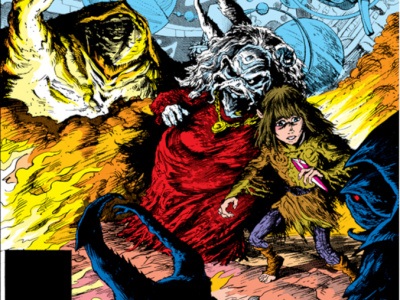Marvel President of Publishing, New Media, and Consumer Products Bill Jemas has been one of the most outspoken figures in the comics business over the last few months, making news with comments about comic retailers (see 'Marvel's No Overprint Policy an 'IQ Test for Retailers''), with the controversial decision to eliminate overprints for the direct market (see 'Marvel's Jemas Explains No Overprint Policy'), and with Marvel's withdrawal from the comics code (see 'Marvel Dumps the Comics Code'). Looking for more information on these and other topics important to pop culture retailers, ICv2 recently submitted a number of written questions to Jemas, and he took time to respond in his usual frank style (we guess it's not just the spoken interviews that bring out that trait).
1.Tell us about your first tenure with Marvel.
In the early 1990's I started up the Entertainment Card business for Fleer Corp (a Marvel subsidiary at the time) and put together the team that ran the business for two years - With licenses from just about every major studio we produced cards for Power Rangers, Batman, Casper, Beavis and Butthead, and the Fox Kids Network. Fleer captured well over 75% of the entertainment card business and Marvel Cards alone represented at least half of our sales (with nearly no returns).
By far, this division was the leading income generator for Marvel, but it was a rocky time for me personally because Marvel's senior management was hell-bent on certain policies which were clearly going to ruin their business and Fleer's.
2.Most industry observers would say that Marvel's editorial quality has gone up substantially during your tenure, as you've brought in some new people and signed some big-name creators to work for Marvel. Marvel's competition has accused Marvel of cutting marketing, promotion, and retailer support in order to apply more resources to big-time creative contracts. Is this true, and is it a good thing or a bad thing?
I can't believe anyone would be stupid enough to make that kind of statement. We are attracting big name creators, and we have big time sales, and guess what more sales means more money for marketing and promotion - not less.
3.Do you have any concerns about your concentration of two of your sales channels for comics with Diamond, given DC's option to acquire the company beginning in 2003?
DC is not going to acquire Diamond.
4.Why is Marvel continuing to sell its titles on the newsstand, given that many of the problems you cited with overprinting for the direct market (wasted books, comics being diverted into the black market, extra costs) are also present on the newsstand?
Newstand has always been, and continues to be, the primary new reader feeder for the direct market.
5.What has the reaction been to Marvel's adoption of its own rating system, either from players down the distribution chain (distributors or retailers), or from other interested parties?
Very positive, except of course for the code mongers themselves.
6.Marvel seems to be moving toward publishing more mature material and withdrawing from an independent rating system at the same time as other industries are coming under increasing threat of government regulation on exactly these issues. Where do you see the public climate headed on the issues of marketing mature material to children, and how do Marvel's moves fit into that context?
Actually, during my tenure, Marvel's most significant major move has been toward kids and teens - with the Ultimates line.
7.Recent Marvels have become more collectible in part because of your no-overprint policy. How does Marvel avoid the kind of boom-and-bust cycle that collectibles have seen in recent years, for example cards in the period when you were at Fleer?
That was not a boom-bust cycle - there were just gross over shipments of bad cards - most of which happened after I left Fleer.
There were also a number of topics on which Jemas did not comment, including the following:
Background questions on his non-Marvel career.
Comparing the Perelman and Perlmutter eras at Marvel.
Who the other companies were that bid on Marvel's direct distribution agreement.
Newsstand distribution numbers and trends.
Why Marvel hasn't more aggressively pursued the collector toy business in the past, and what its plans are for the future.
Plans for Marvel's mature line.







